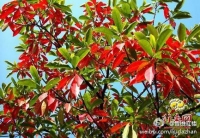| Multiple poems at a time |
DI DU
杕杜
Lu Mingzhishen
Solitary stands the russet pear tree,
With its fruit so bright.
The king's business must not be slackly performed,
And the days are prolonged with us one after another.
The sun and moon are in the tenth month.
My woman's heart is wounded;
My soldier might have leisure [to return]!
Solitary stands the russet pear tree,
With its leaves so luxuriant.
The king's business must not be slackly performed,
And my heart is wounded and sad.
The plants and trees are luxuriant,
But my heart is sad.
O that my soldier might return!
I ascended that hill in the north,
To gather the medlars.
The king's business must not be slackly performed,
And our parents are made sorrowful.
His chariot of sandal wood must be damaged;
His four horses must be worn out;
My soldier cannot be far off.
They have not packed up, they do not come;
My sorrowing heart is greatly distressed.
The time is past, and he is not here,
To the multiplication of my sorrows.
Both by the tortoise shell and the reeds have I divined,
And they unite in saying he is near.
My soldier is at hand!
Translator: James Legge
【Collections】诗经
【Source】 The English translation text was taken from The Chinese Classics, vol. 4 by James Legge (1898) and checked against a reprinted edition by Wen Zhi Zhe chu pan she (Taiwan, 1971). Transliteration of Chinese names in the English translation were converted to
